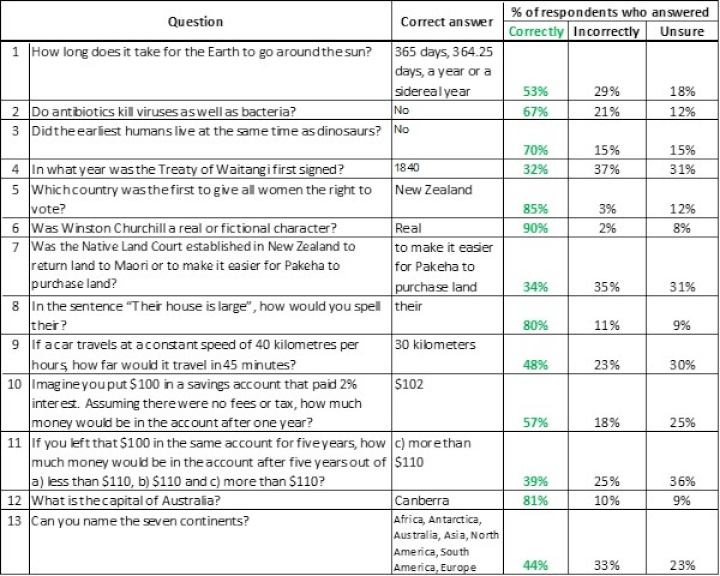New survey finds serious gaps in general knowledge
MONDAY, 18 NOVEMBER 2019
New survey finds serious gaps
in New Zealanders' general knowledge
Wellington (18 November 2019): New research released by The New Zealand Initiative reveals significant gaps in adult New Zealanders’ general knowledge.
Ignorance is not bliss: Why knowledge matters (and why we may not have enough of it) argues that although information is readily available nowadays, our basic knowledge of subjects like geography, history, and maths is low.
To get a glimpse of the state of general knowledge in New Zealand, the Initiative commissioned a representative survey of 1000 voting-age New Zealanders. Respondents were asked 13 general knowledge questions. The results (shown at the bottom of this page) provide a snapshot of Kiwis’ general knowledge.
Though it is encouraging that 85 percent know New Zealand was the first country to give women the vote, and 90% that Winston Churchill was a real, not fictional character, there are serious gaps in what Kiwis know:
• It is surprising that three in ten adult New Zealanders do not know that dinosaurs had already died out before the first humans appeared.
• Just over half of adult New Zealanders know that earth takes a year to circle the sun.
• Not even a third of adult New Zealanders know the year the Treaty of Waitangi was signed.
The survey also exposed significant gaps on basic mathematical, medical and scientific knowledge. This has implications for our political debates.
For example, a third do not know that antibiotics do not kill viruses as well as bacteria. How can we have a debate on issues such as vaccinations, climate change and GM crops if even such basic knowledge is not present?
Our poor grasp of maths is equally concerning. Just over half the population cannot calculate a simple percentage increase, and only just over a third understand compound interest. This is a problem for financial literacy, but also for mastering everyday tasks. Try baking a cake, calculating calories or measuring out medicine doses without basic maths.
Report author Briar Lipson explains: “There may be disagreement about the relevance of some of the survey questions, but we hope there is a consensus that to participate meaningfully in society, some basic knowledge of the world is required”.
As Lipson explains, “Our survey reveals worrying gaps in general knowledge in New Zealand. And it poses a challenge to our education system to correct them. A comprehensive, knowledge-rich curriculum is needed. Without broad general knowledge, we risk excluding a large group of New Zealanders from participating fully in society.”
A future research report, to be released in 2020, will further explore whether New Zealand’s national curriculum is fit for purpose.

ends


 International Writers' Workshop NZ Inc: Ōtepoti Poets Top The Kathleen Grattan Prize For A Sequence Of Poems
International Writers' Workshop NZ Inc: Ōtepoti Poets Top The Kathleen Grattan Prize For A Sequence Of Poems NZ Amateur Sport Association: 22 Amendments Proposed For 2022 Act Lodged On 22 November
NZ Amateur Sport Association: 22 Amendments Proposed For 2022 Act Lodged On 22 November Auckland University of Technology: Reading Helps Children Face A Difficult Future
Auckland University of Technology: Reading Helps Children Face A Difficult Future PATHA: Puberty Blocker Evidence Brief Affirms Aotearoa’s Approach
PATHA: Puberty Blocker Evidence Brief Affirms Aotearoa’s Approach Tataki Auckland Unlimited: Into Ocean & Ice - Unveiling Antarctica's Past And Present
Tataki Auckland Unlimited: Into Ocean & Ice - Unveiling Antarctica's Past And Present Health Coalition Aotearoa: Urgent Action Needed To Address Aotearoa’s Shameful Household Food Insecurity
Health Coalition Aotearoa: Urgent Action Needed To Address Aotearoa’s Shameful Household Food Insecurity